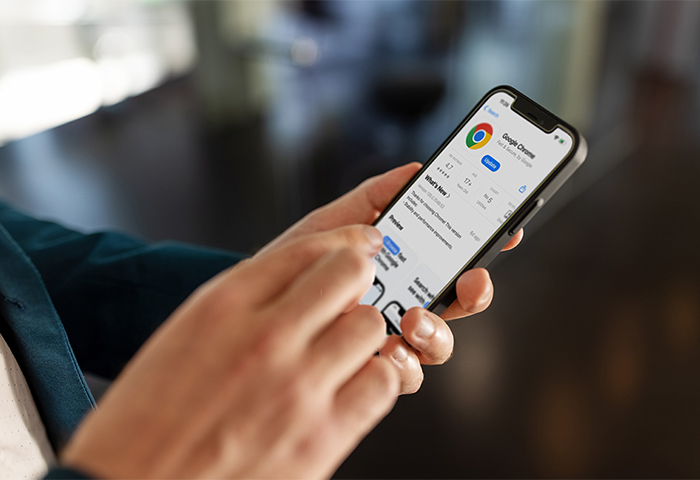What's the most secure browser?
The most secure browser is one that easily protects you against the variety of online threats out there. Frequent updates, sandboxing, VPN integration, anti-phishing protection, and automatic HTTPS encryption are just a few of the ways the best secure browsers keep you safe.
What’s the best private browser?
The best private browsers prevent people from getting their hands on your data. Blocking ads and web trackers is just the beginning — the most private browsers also ward off advanced browser fingerprinting techniques.
Read on to explore the best browsers for privacy and security, presented in alphabetical order. Or skip down below to learn more about why browser security is so important and which browser tops our list as the best for private, secure browsing.
Avast Secure Browser
Built on top of Google’s open-source Chromium platform, Avast Secure Browser includes a comprehensive array of built-in security and privacy tools. Get automatic, built-in blocking against ads, trackers, and browser fingerprinting. And the Bank Mode feature makes Avast Secure Browser one of the most secure browsers available.
%20-%20refresh/img_01.png?width=1200&name=img_01.png)
%20-%20refresh/check-mark-30.svg) Pros
Pros
-
Built-in protection against ads, tracking, fingerprinting, phishing, webcam hacks, and more.
-
The super-secure Bank Mode creates a virtual desktop to isolate sensitive transactions against hacks.
-
Compatible with your favorite Chrome extensions.
-
Video downloader tool lets you easily download videos from YouTube and other sites.
%20-%20refresh/cross-mark-30.svg) Cons
Cons
AVG Secure Browser
AVG Secure Browser is a custom-designed, safe web browser built by dedicated security experts to safeguard your privacy whenever you’re online. Automatically block ads, trackers, and browser fingerprinting, protect your webcam against hacks, prevent phishing attacks, and so much more.
We’ve taken Google’s open-source Chromium platform as our starting point — so you’ll be able to customize it with all your favorite Chrome extensions — and optimized it with a massive range of industry-leading security and privacy features. It’s easy to see why AVG Secure Browser is one of the best secure browsers you'll find.
%20-%20refresh/img_02.png?width=1100&name=img_02.png)
%20-%20refresh/check-mark-30.svg) Pros
Pros
-
Huge set of built-in security and privacy tools.
-
Security and Privacy Center lets you easily manage your settings.
-
Helps prevent adware and malvertising infections with customizable ad-blocking.
-
Includes a free VPN on Android.
%20-%20refresh/cross-mark-30.svg) Cons
Cons
-
Some features, such as Bank Mode, require the use of other AVG products.
-
Not customizable with themes.
Install AVG Secure Browser and then go directly to the super convenient Security & Privacy Center to get started with one of the best browsers for privacy. We’ve made it as easy as possible for you to enjoy a robust suite of security and privacy protections so that you have complete control over your personal data and internet safety.
Brave
Brave is a privacy-centric browser that blocks ads, cookies, and other trackers, and disguises your device against browser fingerprinting. Since many websites and content creators rely on ad revenue to stay afloat, Brave’s privacy browser lets you view some ads in order to support your favorite sites through the opt-in Brave Rewards system.
%20-%20refresh/img_03.png?width=1000&name=img_03.png)
%20-%20refresh/check-mark-30.svg) Pros
Pros
-
Wide feature set includes ad and tracker blocking as well as a password manager, HTTPS encryption, and an integrated Tor mode.
-
Protects against unwanted scripts.
-
Compensates for ad blocking with an opt-in reward system.
%20-%20refresh/cross-mark-30.svg) Cons
Cons
-
Using the Brave Rewards system means you’ll see ads.
-
Profits from ads in Brave benefit the browser rather than the sites they’re displayed on.
-
Limited catalog for browser extensions.
Chrome
Google Chrome is by far the world’s most popular browser, commanding about two-thirds of the global browser market share. But while Chrome’s popularity can’t be denied, it’s nowhere near one of the best browsers of 2023 in terms of security and privacy.
Is Chrome secure? The good news is that Google updates Chrome frequently, but you’ll find little else in terms of built-in security and privacy features.
%20-%20refresh/img_04.png?width=1000&name=img_04.png)
%20-%20refresh/check-mark-30.svg) Pros
Pros
-
Frequent updates protect against security exploits.
-
Massive range of security and privacy Chrome extensions available.
-
Includes some protection against dangerous websites and phishing attacks.
%20-%20refresh/cross-mark-30.svg) Cons
Cons
You can reclaim some of your privacy by blocking Chrome pop-ups and adjusting other settings in both Chrome and your Google accounts, and by adding certain browser extensions. But privacy-minded folks should use one of the other browsers on this list.
Chromium
Google’s open-source Chromium project provides the foundation for many of the best secure browsers on this list, from AVG Secure Browser to Microsoft Edge and Chrome itself. Because Chromium was built more as a toolbox than a standalone browser, you can’t simply download an installation file the way you can for other browsers.
Instead, you need to download the latest Chromium archive for your operating system and extract it to your chosen storage location — typically your Program Files on PC or Applications on a Mac.
%20-%20refresh/img_05.png?width=1200&name=img_05.png)
%20-%20refresh/check-mark-30.svg) Pros
Pros
-
Lightweight, customizable, and responsive.
-
Access to all Chrome extensions.
%20-%20refresh/cross-mark-30.svg) Cons
Cons
DuckDuckGo (mobile only)
DuckDuckGo is a popular search engine for privacy-minded folks who don’t want big tech companies tracking all the digital crumbs they leave online. And the same philosophy applies to the DuckDuckGo mobile app — it’s a mobile browser that doesn’t collect data on what you do online. Using one of the best secure browsers is a great way to enhance your smartphone privacy.
%20-%20refresh/img_06.png?width=1000&name=img_06.png)
%20-%20refresh/check-mark-30.svg) Pros
Pros
-
Blocks ads and trackers and enforces encryption when browsing.
-
Automatically routes your searches through the private DuckDuckGo search engine.
-
Rates websites with a privacy grade ranging from A to F.
%20-%20refresh/cross-mark-30.svg) Cons
Cons
Microsoft Edge
Microsoft Edge is the newest browser from the PC software giants, replacing the longstanding Internet Explorer as the default browser on all Windows devices. Edge currently runs on Chromium, the same browser kit developed by Google that powers Chrome, AVG Secure Browser, and many others. But is it one of the best privacy browsers?
%20-%20refresh/img_07.png?width=800&name=img_07.png)
%20-%20refresh/check-mark-30.svg) Pros
Pros
%20-%20refresh/cross-mark-30.svg) Cons
Cons
Outdated software — like Internet Explorer — is frequently targeted with exploits. It’s important to remember that software updates often include critical security patches, so no matter which browser you use, choose one that regularly receives updates.
Epic
Epic Privacy Browser lands on your device with many privacy-oriented features activated by default, making it a strong contender for the best privacy browser. Epic blocks ads, trackers, and browser fingerprinting. It also deactivates autofill, spell check, auto-sync, and other common features that typically rely on unfettered access to your data.
%20-%20refresh/img_08.png?width=1200&name=img_08.png)
%20-%20refresh/check-mark-30.svg) Pros
Pros
%20-%20refresh/cross-mark-30.svg) Cons
Cons
Firefox
Mozilla has long advocated for more privacy, security, and transparency. Their open-source Firefox browser has always been free for anyone to inspect, establishing it as a strong contender in the security category from the get-go. And Firefox is still the most popular third-party browser in terms of global market share.
%20-%20refresh/img_09.png?width=1200&name=img_09.png)
%20-%20refresh/check-mark-30.svg) Pros
Pros
-
Offers protections against tracking, fingerprinting, and browser-based cryptominers.
-
Receives frequent security updates to help keep hackers out.
-
Open-source code can easily be inspected for integrity.
%20-%20refresh/cross-mark-30.svg) Cons
Cons
-
Does Firefox track you? Yes, unless you disable its ability to send data back to Mozilla.
-
Requires third-party extensions for automatic HTTPS encryption and other features that the best secure browsers have built-in.
-
Default settings don’t offer top protection.
Opera
Opera is an old player in the browser game, having pioneered many of the features we now take for granted, like browser tabs. Opera was also the first browser to introduce built-in pop-up blocking. It’s hard to imagine any of the best secure browsers or best browsers for privacy without these two essential features.
%20-%20refresh/img_10.png?width=1200&name=img_10.png)
%20-%20refresh/check-mark-30.svg) Pros
Pros
%20-%20refresh/cross-mark-30.svg) Cons
Cons
Safari (macOS & iOS only)
As Apple’s flagship browser, Safari is optimized for macOS and iOS. Though Safari used to be available for Windows and Android devices, it no longer supports those platforms — you’ll need to pick another of the best privacy browsers for your PC or Android. But Safari browser for iOS and macOS has plenty to offer.
%20-%20refresh/img_11.png?width=1200&name=img_11.png)
%20-%20refresh/check-mark-30.svg) Pros
Pros
-
Third-party ad tracking cookies and cross-site tracking are blocked by default.
-
Generates new passwords for you and stores them in your iCloud Keychain, which is protected with AES-256 encryption.
-
Runs all pages and tabs in separate sandboxes, meaning that malicious code from one tab won’t infect your entire browser.
%20-%20refresh/cross-mark-30.svg) Cons
Cons
-
No native ad blocking, so your only choice to block Safari pop-ups and other ads is a third-party browser extension.
-
Like many browsers, Safari uses Google’s Safe Browsing list for website safety, which means that it sends your browsing data to Google.
-
Not available for Windows or Android.
Tor Browser
The Tor network is a system of proxy servers, or nodes, that encrypt and redirect traffic to hide its users’ identities while online. Tor Browser gives you access to this network with one of the best browsers for privacy — it prioritizes privacy above all other concerns, including usability and convenience.
%20-%20refresh/img_12.png?width=1200&name=img_12.png)
%20-%20refresh/check-mark-30.svg) Pros
Pros
-
Conceals your identity in the Tor network, which encrypts your internet traffic three times over.
-
Won’t store your browsing history, deletes all cookies, and disrupts browser fingerprinting methods.
-
Comes preconfigured with extensions that enforce automatic HTTPS encryption and prevent unauthorized websites from running scripts in your browser.
%20-%20refresh/cross-mark-30.svg) Cons
Cons
-
Adding additional extensions or changing your browser settings may compromise your protection.
-
Too slow for daily use.
-
Unless you connect first to a VPN, your internet service provider (ISP) can also see that you’re using Tor (and many ISPs don’t like it).
Vivaldi
Created by Opera’s former CEO and known for its customizability, Vivaldi offers near-total control over how its browser looks and functions. It’s based on the Chromium platform, so it blocks ads and trackers by default just like many of the most secure browsers and best browsers for privacy.
%20-%20refresh/img_13.png?width=1200&name=img_13.png)
%20-%20refresh/check-mark-30.svg) Pros
Pros
-
Transparent privacy policy outlines the type of data it collects — your user ID number and basic device info — and what it does with that data.
-
Can set different search engines for normal and private mode, and adjust your security settings for each search engine you use.
-
Encrypted data sync between devices.
%20-%20refresh/cross-mark-30.svg) Cons
Cons
Waterfox
Firefox is an open-source browser, meaning that anyone can inspect its code and build something else with it. And people do — Waterfox is a Firefox offshoot with several noticeable differences. But are these enough to make it one of the best web browsers in 2023 for privacy or security?
%20-%20refresh/img_14.png?width=1200&name=img_14.png)
%20-%20refresh/check-mark-30.svg) Pros
Pros
-
Disables Firefox’s telemetry (data measurement and collection) by default.
-
Routinely deletes stored data to evade online trackers. Many other browsers don’t, requiring a specialized extension or browser cleaning tool instead.
%20-%20refresh/cross-mark-30.svg) Cons
Cons
-
Is Waterfox browser safe? Some reviewers have noted that Waterfox is slower to receive security updates than Firefox.
-
In early 2020, Waterfox was acquired by the online advertising company System1.
So, which browser is best for private, secure browsing?
AVG Secure Browser is the best all-around browser for private and secure browsing. You’ve got secure password management, defense against webcam hacking, automatic HTTPS encryption, anti-phishing detection to protect your data, and advanced browser fingerprinting protection.
As far as the most secure browsers go, it’s hard to imagine a better setup.
If you’re looking for privacy above all else, Tor Browser is the way to go — though its privacy features also make Tor Browser too slow and inconvenient for everyday use. And while Epic Privacy Browser also prioritizes privacy, you’ll have to go without a password manager and other conveniences like auto-sync and spell check.
Of the big four — Chrome, Edge, Safari, and Firefox — Firefox is the strongest choice. Unlike Safari, it’s available on all major desktop and mobile operating systems. And with a quick trip to the settings, you can opt out of Mozilla’s data-collection practices. Throw on a few choice extensions, and Firefox becomes an effective browser for both privacy and security.
Depending on your needs and preferences, different browser features will take priority over others. The answer to which browser is best for private browsing and what’s the most secure web browser may differ from person to person.
Why is using a secure browser so important?
Every time you browse the web, you’re leaking a ton of personal info. Companies use this data to target ads to your preferences and habits. The claims about “personalization” and “relevant advertising” are just another way of saying that they’re using your data to show you goods and services you’re more likely to buy.
Tracking cookies and browser fingerprinting are just two ways that ad providers, social media platforms, and other parties follow you online.
%20-%20refresh/icon_10.svg) Tracking cookies: Cookies are small files that websites place in your browser. Some cookies are helpful, but others collect information about your habits and preferences. Disable third-party cookies if you don’t want your online activity tracked.
Tracking cookies: Cookies are small files that websites place in your browser. Some cookies are helpful, but others collect information about your habits and preferences. Disable third-party cookies if you don’t want your online activity tracked.
%20-%20refresh/icon_02.svg) Browser fingerprinting: Through the use of special scripts or code, websites harvest information about your browser and device. This data becomes your browser fingerprint.
Browser fingerprinting: Through the use of special scripts or code, websites harvest information about your browser and device. This data becomes your browser fingerprint.
Fingerprinting lets sites identify you even if you block cookies and use a VPN. Thankfully, strong anti-tracking software can prevent advertisers and others from using your browser fingerprint to track you.
Meanwhile, enterprising hackers and other cybercriminals are always on the lookout for new victims. Phishing and pharming attacks, browser-based malware, malvertising, and scareware pop-ups are just a few ways they can take advantage of you and your devices.
What makes a browser private and secure?
The best browsers for security and privacy go beyond blocking cookies and ads. Here’s a quick look at more specialized features you can expect in the most secure and private browsers.
%20-%20refresh/icon_01.svg) Anti-tracking features to block third-party tracking cookies and other web-tracking technology.
Anti-tracking features to block third-party tracking cookies and other web-tracking technology.
%20-%20refresh/icon_02.svg) Anti-fingerprinting tools to protect your device against browser fingerprinting methods and stay anonymous while browsing.
Anti-fingerprinting tools to protect your device against browser fingerprinting methods and stay anonymous while browsing.
%20-%20refresh/icon_03.svg) Anti-phishing protection to ensure safe browsing by guarding against malicious websites, identity theft, and identity fraud.
Anti-phishing protection to ensure safe browsing by guarding against malicious websites, identity theft, and identity fraud.
%20-%20refresh/icon_04.svg) Automatic ad-blocking to save you from being bombarded with ads and reduce your risk of an adware infection or an encounter with malvertising.
Automatic ad-blocking to save you from being bombarded with ads and reduce your risk of an adware infection or an encounter with malvertising.
%20-%20refresh/icon_05.svg) Built-in password management to create and store unique passwords for all your accounts.
Built-in password management to create and store unique passwords for all your accounts.
%20-%20refresh/icon_06.svg) Extension verification to block suspicious third-party browser extensions and ensure that you’re installing only trusted extensions.
Extension verification to block suspicious third-party browser extensions and ensure that you’re installing only trusted extensions.
%20-%20refresh/icon_07.svg) Automatic HTTPS encryption to protect your sensitive personal data when visiting unsecured sites.
Automatic HTTPS encryption to protect your sensitive personal data when visiting unsecured sites.
%20-%20refresh/icon_08.svg) Webcam protection to prevent unauthorized websites and hackers from hijacking your webcam and spying on you.
Webcam protection to prevent unauthorized websites and hackers from hijacking your webcam and spying on you.
%20-%20refresh/icon_09.svg) Built-in VPN integration to encrypt your traffic and hide your IP address. For example, AVG Secure Browser for Android gives you free VPN access directly in your browser.
Built-in VPN integration to encrypt your traffic and hide your IP address. For example, AVG Secure Browser for Android gives you free VPN access directly in your browser.
The free AVG Secure Browser includes every single one of the features listed here — you’ll find them all in the easy-to-use Security & Privacy Center. Get all this and more with the browser that’s been designed from the start to preserve your privacy and security online.
What’s the most secure browser for mobile?
AVG Secure Browser brings its advantages to Android — plus a free VPN as well. If you’re on iOS, take a look at DuckDuckGo. As one of the most secure mobile browsers, it doesn’t track your online activity, and all your searches are routed through DuckDuckGo’s privacy-focused search engine.
Why you need a VPN for truly secure and private browsing
To stay truly anonymous online, use a VPN (virtual private network) — a securely encrypted tunnel through the internet that conceals your IP address and location. A VPN includes encryption that ensures that your personal data stays safe from hackers, even on unsecured public Wi-Fi.
What are the best security and privacy extensions?
The best security and privacy extensions are made by reputable developers and outfit your browser with additional protections. If you’re using a Chromium-based browser like AVG Secure Browser, you can use the best security and privacy extensions for Chrome on your browser as well.
Why isn’t private browsing or incognito mode good enough?
In the world of digital privacy and security, going incognito is only a small first step. Private browsing mode or Chrome’s Incognito won’t log your browsing history on your own device — but it also won’t hide your IP address or online activity from websites, ISPs, employers, or governments.
Browse securely and privately with AVG Secure Browser
There’s more to internet privacy and security than just blocking ads and cookies. Rather than having to protect yourself by actively enabling the features you need and bloating up your browser with extensions, use a browser that’s designed specifically for privacy and security.
AVG Secure Browser protects you from the moment you install it on your computer or phone. With built-in anti-fingerprinting and anti-phishing safeguards, always-on HTTPS encryption, webcam protection, a password manager, and even a free VPN for your Android smartphone, AVG Secure Browser gives you all the tools you need to stay truly safe online.
%20-%20refresh/The_best_browsers_for_security_and_privacy-Hero_refresh.jpg?width=1200&name=The_best_browsers_for_security_and_privacy-Hero_refresh.jpg)
%20-%20refresh/img_01.png?width=1200&name=img_01.png)
%20-%20refresh/img_02.png?width=1100&name=img_02.png)
%20-%20refresh/img_03.png?width=1000&name=img_03.png)
%20-%20refresh/img_04.png?width=1000&name=img_04.png)
%20-%20refresh/img_05.png?width=1200&name=img_05.png)
%20-%20refresh/img_06.png?width=1000&name=img_06.png)
%20-%20refresh/img_07.png?width=800&name=img_07.png)
%20-%20refresh/img_08.png?width=1200&name=img_08.png)
%20-%20refresh/img_09.png?width=1200&name=img_09.png)
%20-%20refresh/img_10.png?width=1200&name=img_10.png)
%20-%20refresh/img_11.png?width=1200&name=img_11.png)
%20-%20refresh/img_12.png?width=1200&name=img_12.png)
%20-%20refresh/img_13.png?width=1200&name=img_13.png)
%20-%20refresh/img_14.png?width=1200&name=img_14.png)














